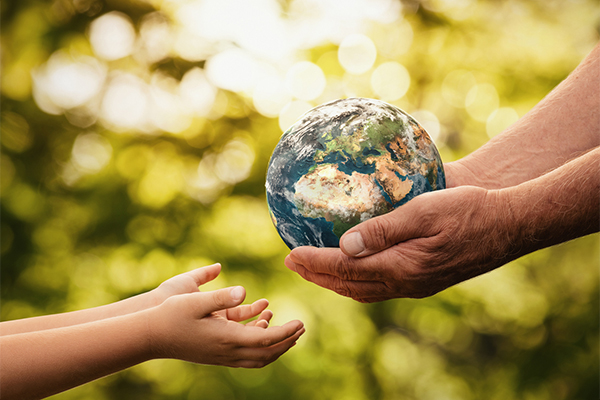This month we’ve seen the record for the world’s hottest day broken twice in one week in Europe and terrible flooding in Kerala, India.
We know from our recent Public Perceptions Survey that more than half (57%) of UK adults say their mental health is affected by the climate crisis.
This rises to 63% for those aged 16 to 24 and to nearly three quarters (73%) of people who’ve experienced a mental health issue in the last five years.
“Climate change is unequivocally severely impacting both physical and mental health with those most vulnerable at greatest risk,” says Deborah Lane, a BACP member and counsellor who works with children and their families,
“It’s the greatest threat facing humanity, with its impacts on all planetary systems already acutely affecting people and all forms of life across the globe.”
What does climate anxiety look like?
“Eco anxiety ranges from worry, fear, frustration, helplessness to hopelessness, sadness, despair, and anger and can result in individuals feeling overwhelmed, burnt-out and immobilised, experiencing disruption to daily function,” adds Deborah,
“Whilst these emotions are a normal response, when they become persistent and unmet, they can cause long-term emotional distress. As well as causing significant distress, responses such as denial can overwhelm and create barriers to effective climate action. This leads to significant concern about our capacity to act at the time we most need to.”
BACP member, therapist and climate psychologist Linda Aspey says climate change used to feel distant for most people in the UK, but in the last few years it’s starting to feel closer to home.
“With more extreme weather events like floods, droughts and fires, and related issues of loss of biodiversity in nature, pollution in our air, soil and water, and talk of food insecurity, it’s not surprising that more than half of people in the UK are worried about climate change.
“These emotions are often called “eco anxiety ” and yet it’s more nuanced than that. It’s sometimes a mixture of distress, frustration, anger, grief and even numbness – all very normal and natural responses to the losses and the uncertainties we face.”
Young people feel powerless and abandoned
Linda says: “Young people are increasingly sharing their feelings of despair, powerlessness and a loss of motivation. They ask why should they finish their education when the grownups and leaders aren’t doing all they can to build a safer world?
“Often this is because they feel isolated because while mainstream society has begun to talk more about climate change, it’s rarely at an emotional level, and mostly at a practical level. So where do people go to express their grief at the loss of world they know, their fear for the future, perhaps even their growing reluctance to have children?”
Deborah agrees, “They’re much more aware of climate and environmental change than previous generations and many fear for the future. There’s compelling evidence for the negative impacts of climate change on children’s mental health and emotional wellbeing.
“They feel abandoned, dismissed and betrayed by the people and systems that should be protecting and believe their views are neglected in research and policymaking.
“They need to be given appropriate facts and be supported to explore, process and act.
"While some schools are increasing exposure to climate issues in their teaching, they often don’t do this with sufficient psychological resources for children to explore the powerful feelings they experience in response to these materials. Often teachers feel ill-equipped to support meaningful conversations and empower pupils to take concerted action.”
Deborah says there are opportunities to include climate informed wellbeing interventions into schools, colleges and third sector organisations to help support children and young people.
Tips on how to cope
Get chatting
Linda believes we need to talk about what’s happening so we can build greater resilience, better relationships, and stronger communities.
“This could be chatting with friends, going to a Climate Café listening circle, joining a local support group, or seeing a registered counsellor to help work through your feelings.”
Get involved
Deborah suggests getting involved with organisations and projects like Carbon Conversations, The Work that Reconnects, and Active Hope, as well as initiatives through organisations such as the Climate Psychology Alliance and Transition Towns who offer networking and support for individuals.
She adds: “There’s good evidence that getting involved in climate action can have a protective effect and boost good mental health, building connections, hope, and agency.”
“One of the questions people most ask themselves is “What can I do?” There’s lots of ways to get involved that help both you and others,” says Linda,
“Think about the skills you already have – you might be a great listener who could learn to facilitate climate cafes in your own community. Or you might be good at writing, painting or cooking – local environmental or climate activist groups are always looking for help with marketing, promotions and holding community meetings.”
Get outside
Linda suggests arranging regular walks with friends or going on a foraging course to learn more and sharing what you learn.
“Being out in the natural world is proven to boost wellbeing – even if you go out only for a few minutes a day.
“Equally important is managing just how much news you take in – and helping others to do the same. “Doom scrolling” can become horribly addictive, so putting away phones and getting outdoors is a great antidote.”
Get help from a therapist
“You can also speak to a climate aware registered therapist who’ll help you explore the roots of your distress,” says Deborah,
“For many, having their feelings acknowledged and understood helps them to move through their difficulty and paralysis, and leads to hope, connection with others.”
To find a therapist who can help you with climate anxiety visit our Therapist Directory.

How to get therapy
Where and how you can get access to counselling and psychotherapy, including free and paid for services

BACP Mindometer 2023
Our annual survey into the state of the nation's mental health

Mental health impact of climate change
Our research found eco-anxiety affects 55% of UK adults
